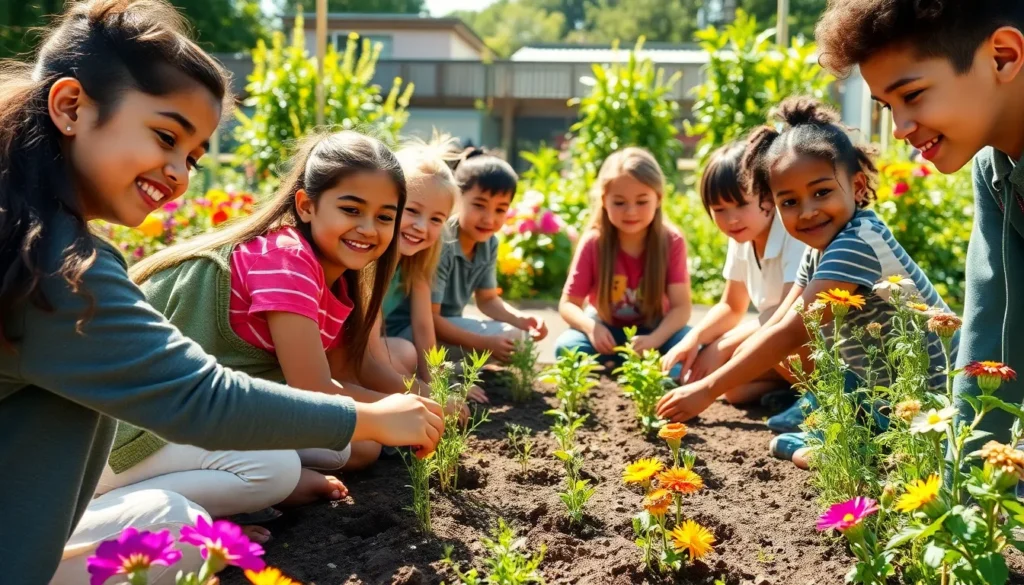In a world increasingly aware of environmental challenges, eco-friendly education emerges as a vital approach to shaping future generations. This innovative educational model not only imparts knowledge about sustainability but also fosters a sense of responsibility towards the planet. By integrating eco-conscious practices into curricula, schools can inspire students to become proactive stewards of their environment.
From outdoor classrooms to green school buildings, eco-friendly education encompasses a range of practices that promote environmental awareness. It encourages hands-on learning experiences that connect students with nature, sparking curiosity and a desire to protect it. As educators embrace this transformative approach, they equip students with the skills and mindset needed to tackle pressing ecological issues, ensuring a brighter, more sustainable future for all.
Table of Contents
ToggleUnderstanding Eco-Friendly Education
Eco-friendly education focuses on integrating environmental principles into learning practices. This educational model emphasizes sustainable practices and fosters a responsibility towards planet stewardship.
Definition of Eco-Friendly Education
Eco-friendly education involves teaching students about environmental issues and sustainable practices. It incorporates hands-on experiences that highlight conservation, recycling, and biodiversity. Eco-friendly education aims to create an informed generation equipped to make environmentally conscious decisions.
Importance of Sustainability in Learning
Sustainability in learning enhances critical thinking and problem-solving skills. It encourages students to understand their impact on the environment. Engaging with sustainable practices fosters a sense of community and responsibility. Through sustainability-focused programs, students develop skills that apply not only in academic settings but also in everyday life. Schools incorporating sustainability in their curriculum often report higher student engagement and achievement.
Principles of Eco-Friendly Education

Eco-friendly education encompasses core principles that foster sustainability and environmental stewardship. The following principles focus on enhancing students’ understanding of ecological issues and encouraging responsible behaviors.
Integrating Environmental Awareness
Integrating environmental awareness into curricula enhances student engagement with ecological concepts. Educational institutions should focus on topics like climate change, conservation, and renewable energy sources. Effective integration includes field trips to local ecosystems, workshops on recycling, and projects that emphasize biodiversity. By exposing students to real-world environmental challenges, schools foster critical thinking and inspire meaningful action. Learning experiences that connect students with nature encourage a deeper understanding of ecological systems and their importance.
Encouraging Sustainable Practices
Encouraging sustainable practices within school environments reinforces eco-friendly principles. Schools can implement waste reduction strategies, such as composting and recycling programs, to model responsible resource use. Activities like planting school gardens or maintaining outdoor classrooms promote hands-on learning while fostering a connection to local ecosystems. Furthermore, involving students in energy conservation efforts, including monitoring utility usage and advocating for renewable energy sources, cultivates a sense of ownership and responsibility. Sustainability-focused initiatives empower students to adopt environmentally conscious habits that extend beyond the classroom.
Benefits of Eco-Friendly Education
Eco-friendly education provides numerous advantages, influencing both students and local communities significantly. This approach fosters a deeper understanding of environmental stewardship and cultivates a culture of sustainability.
Impact on Students’ Mindsets
Eco-friendly education transforms students’ mindsets toward proactive environmental engagement. Students gain awareness of pressing ecological issues, developing critical thinking and problem-solving skills. By participating in hands-on activities, such as managing school gardens or conducting recycling programs, students form a personal connection to sustainability. Increased knowledge of environmental science encourages learners to make informed decisions, shaping their habits and values toward a greener lifestyle. Students empowered through this education often become advocates for change, inspiring peers and families to adopt similar eco-friendly practices.
Contributions to Local Communities
Eco-friendly education strengthens ties between schools and local communities. Schools that embrace sustainability foster community involvement by collaborating with local organizations and promoting environmental initiatives. Activities like tree planting, community clean-ups, and local sustainability projects enhance community resilience and awareness. By actively engaging with community members, schools can share knowledge about sustainable practices, creating a ripple effect that extends beyond the classroom. This collaboration fosters a shared responsibility for environmental preservation, ensuring that eco-conscious values are embedded within the community fabric, ultimately leading to a more sustainable society.
Implementing Eco-Friendly Education Practices
Implementing eco-friendly education practices involves integrating sustainability principles into various aspects of the educational process. Schools foster environmental stewardship through two main areas: curriculum development and innovative teaching methods.
Curriculum Development
Curriculum development in eco-friendly education focuses on integrating environmental topics into all subjects. Educators design courses that address climate change, conservation, and renewable energy. They include project-based learning, where students tackle real-world environmental issues, thus enhancing problem-solving skills and critical thinking.
Moreover, interdisciplinary approaches connect subjects, highlighting the interconnectedness of ecology with science, geography, and social studies. Students explore local ecosystems, tracking biodiversity and understanding human impacts on nature. By engaging with local environmental organizations, schools enrich the curriculum, offering students firsthand experiences and resources that promote sustainability.
Innovative Teaching Methods
Innovative teaching methods enhance eco-friendly education by encouraging active participation and experiential learning. Techniques such as outdoor classrooms allow students to engage closely with nature while learning about ecosystems.
Additionally, educators utilize technology to implement simulations and virtual field trips that expose students to global environmental challenges. Collaborative group projects build teamwork skills and inspire engagement in sustainability initiatives. Schools can implement service learning, where students participate in community-based environmental projects, further solidifying their role as active citizens.
By incorporating these practices, educational institutions not only prepare students for a sustainable future but also cultivate a generation that values and protects the environment.
Challenges in Eco-Friendly Education
Several challenges hinder the widespread adoption of eco-friendly education, impacting its effectiveness and integration within school systems.
Resistance to Change
Resistance to change often stems from various stakeholders, including educators, administrators, and parents. Many educators may doubt the feasibility of implementing eco-friendly practices within established curricula. Administrators may prioritize standardized testing over innovative teaching methods, causing reluctance to adopt new approaches. Parents may express concerns about changes in teaching content and methods, leading to opposition against eco-friendly initiatives. This collective resistance can slow down the progress of integrating ecological principles into education.
Resource Limitations
Resource limitations also present a significant barrier to eco-friendly education. Many schools operate on tight budgets, restricting access to materials necessary for implementing sustainable practices. Environmental programs often lack funding for crucial resources, such as eco-friendly supplies and experiential learning opportunities like field trips. Additionally, inadequate training for educators can hinder their ability to teach environmental topics effectively. Schools may face challenges in collaborating with community organizations that can provide resources and support, limiting the implementation of comprehensive eco-education programs.
Eco-friendly education plays a crucial role in shaping a sustainable future. By integrating environmental principles into the learning process, it empowers students to become informed and responsible stewards of the planet. Schools that embrace this approach not only enhance student engagement but also foster a community-wide commitment to ecological preservation.
As students connect with nature through hands-on experiences, they develop critical thinking skills and a proactive mindset. This educational model cultivates a generation that values sustainability and is equipped to tackle pressing environmental challenges. The journey toward eco-friendly education may face obstacles, but the long-term benefits for individuals and communities are undeniable. Embracing these practices is essential for nurturing a more sustainable world.






